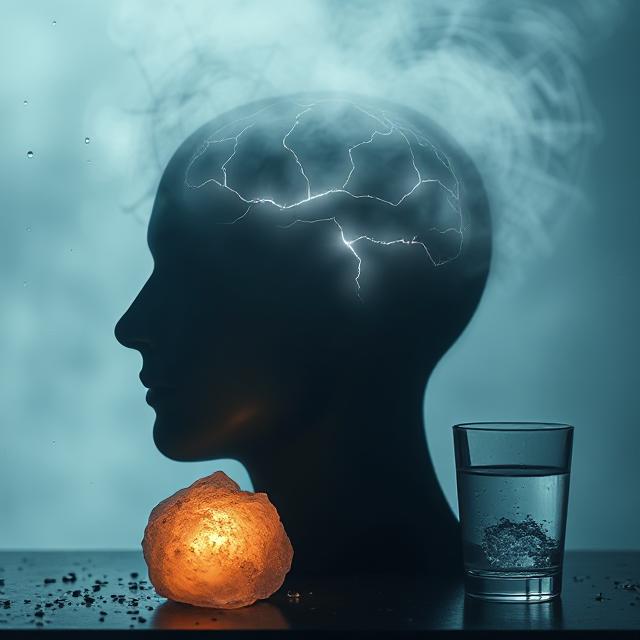
Table of Contents
Sodium Deficiency and Cognitive Fog: The Overlooked Brain Drain
In the age of low-sodium diets and chronic hydration advice, sodium has become an unsung hero—often misunderstood, overly restricted, and dangerously depleted. For those struggling with cognitive fog, poor focus, low energy, or irritability, sodium deficiency might be the hidden culprit.
Contrary to outdated assumptions, your brain needs sodium—not just for hydration, but for electrical signaling, nutrient transport, and synaptic clarity. This article breaks down how sodium impacts cognition, what causes its depletion, and how to reestablish balance for sharper mental performance.
🧠 Why Sodium Is Essential for Brain Function
Sodium is not just “salt.” It is the primary extracellular electrolyte that:
- Regulates neuron firing and action potentials
- Balances fluid around and inside brain cells
- Drives glucose and amino acid uptake into the brain
- Influences serotonin, dopamine, and cortisol activity
- Helps maintain blood pressure—especially in the brain
Your brain functions like an electrical grid, and sodium is the voltage carrier. When it drops too low, mental slowness, fog, and mood instability follow.
⚠️ Symptoms of Sodium Deficiency (Hyponatremia)
Even mild sodium deficiency—especially in the context of overhydration or fasting—can cause:
| Symptom | Explanation |
|---|---|
| Brain fog | Neurons fire inefficiently without sodium-driven voltage |
| Headaches | Swelling of brain cells from disrupted fluid balance |
| Poor focus | Glucose delivery to the brain is impaired |
| Irritability or anxiety | Cortisol regulation and neurotransmission affected |
| Dizziness or fatigue | Sodium helps regulate blood volume and pressure |
| Muscle weakness | Sodium loss impairs nerve-muscle coordination |
These symptoms often mimic those of burnout or low blood sugar, leading many to miss the true cause: electrolyte depletion.
🧪 What Causes Sodium Depletion?
1. Overhydration
Drinking large amounts of water without electrolytes dilutes sodium in the blood, causing hyponatremia. This is common in health-conscious individuals and athletes alike.
2. Low-Sodium Diets
Chronic avoidance of salt—due to hypertension fears or dietary trends—can leave the nervous system underpowered. The kidneys tightly regulate sodium, but long-term deprivation downshifts brain energy.
3. Fasting & Keto Diets
Both promote water and sodium loss:
- Glycogen stores release water
- Insulin suppression increases sodium excretion
Without conscious sodium replenishment, mental fog, headaches, and fatigue are common.
4. High Stress
Cortisol can raise sodium excretion and impair retention, especially during chronic stress or intense mental labor. This can create a loop: stress increases sodium loss, which worsens cognitive resilience.
5. Diuretics, Caffeine, and Alcohol
All three promote sodium excretion. When combined with low-sodium intake, the cognitive effects can be dramatic—especially in the elderly or those fasting intermittently.
🔬 How Sodium Powers the Mind
Sodium powers the sodium-potassium pump, which:
- Restores resting potential after neurons fire
- Regulates nutrient transport (especially glucose)
- Prevents neuron swelling or shrinkage
Without enough sodium:
- Brain cells swell from osmosis (causing pressure, fog, or even seizures in extreme cases)
- Action potentials slow down or misfire
- Brain glucose usage drops—leading to fatigue and poor memory
Your brain runs on voltage, glucose, and neurotransmitters—all of which depend on sodium.
🧂 Not All Salt Is Equal
While table salt can technically replace sodium, unrefined salts (like Celtic sea salt or Himalayan salt) offer:
- Sodium chloride plus magnesium, potassium, and trace minerals
- Better flavor and more natural hydration synergy
- Less processing and no added aluminum or anti-caking agents
Use these in hydration rituals, especially:
- First thing in the morning (after a night of passive loss)
- Mid-study session (to restore alertness and focus)
- Pre- or post-fast (especially with keto or sauna use)
⚖️ Sodium Needs: How Much Is Optimal?
Despite mainstream fears, new research suggests:
- 1.5–3 grams of sodium daily is the minimum for function
- 4–5 grams may be optimal for active or keto individuals
- 8+ grams may be safe for athletes and heat exposure, if paired with potassium and magnesium
Sodium sensitivity is individual—but chronic restriction often backfires, especially for those doing cognitive or metabolic stress protocols (fasting, low-carb, etc.).
Blood pressure rises not from sodium alone, but from imbalance: too much sodium, not enough potassium, and poor kidney function.
🧠 How to Use Sodium for Cognitive Clarity
Pre-Study Brain Boost
Try a hydration tonic:
- 12–16 oz filtered water
- 1/8 tsp sea salt
- Optional: pinch of potassium salt + lemon juice
- Sip slowly before focus work
This increases alertness and mental clarity without caffeine.
Fasting Support
Add sea salt to water during fasts—especially in the morning or during energy dips. This prevents lightheadedness and brain fog caused by electrolyte shifts.
Post-Workout Brain Reboot
Sweating depletes sodium. Replenishing with salt + carbs helps restore cognitive resilience and prevent the crash that often follows workouts.
🧠 Case Study: From Fog to Focus with Sodium
A mid-30s entrepreneur came in reporting brain fog, midday headaches, and caffeine dependency. Despite a clean diet and 16:8 fasting routine, his performance was crashing.
Bloodwork was normal—but his sodium was at the low end of normal, and he was drinking 2.5+ liters of water daily without electrolytes.
After introducing:
- 2 servings of saltwater (1/4 tsp sea salt + lemon) per day
- More potassium-rich foods
- A post-fast salty broth
He reported clearer focus, fewer cravings, and no afternoon crashes—all within a week.
🧭 Final Takeaway: Don’t Fear the Salt
Sodium deficiency is an often-overlooked cause of cognitive dysfunction—especially in health enthusiasts, fasters, and knowledge workers.
Rather than fear sodium, learn to balance it:
- Pair it with potassium-rich foods
- Choose mineral salts over processed ones
- Adjust based on your diet, sweat levels, and stress load
Your brain is electrical. Sodium is the spark.
